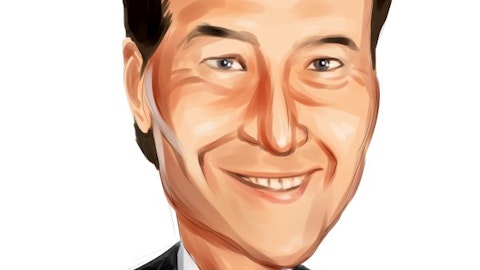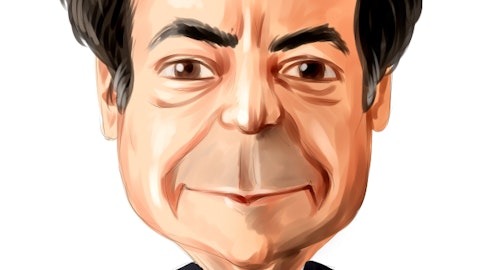Hedge funds underperformed the S&P 500 Index by a large margin in 2013. This fact is startling but it’s still meaningless. Unfortunately, most investors and journalists don’t understand this. Comparing returns without adjusting for risk will lead to the wrong conclusions. An average hedge fund returned around 6.5% in 2013 whereas the S&P 500 Index returned more than 29%. First of all, the S&P 500 index doesn’t include dividend payments in its calculations, so investors shouldn’t even use the S&P 500 index’s return as a yardstick. Using the SPDR S&P 500 ETF Trust (NYSEARCA:SPY) is a more accurate yardstick that represents passive investors’ experience. In 2013 SPY returned 32.3% including dividend payments. Unfortunately the risk adjusted return of SPY is zero. Anyone could have made 32% in 2013 simply by assuming the market risk.
Hedge funds use a variety of instruments. It only makes sense to compare equity hedge funds to the S&P 500 Index. Equity hedge funds usually have less than 100% market risk exposure. This means they are less risky than passive index funds like SPY. A hedge fund that consistently returns 7-8% per year is a much better investment alternative than an index fund that returns 32% in some years and loses 37% in others. Insider Monkey tracks more than 500 equity hedge funds. We developed a proprietary investment strategy that identifies the most promising stock picks of hedge funds. This strategy’s stock picks returned 53.2% in 2013. These stocks had an average beta of 1.19 so any regular investor with the same market exposure would have returned 38.3%. Fortunately, we did about 15 percentage points better than that. This indicates that hedge funds’ certain stock picks can generate large risk adjusted returns.
In this article, we will highlight three hedge fund managers who demonstrated strong stock picking skills. In the third spot is Glenview Capital’s Larry Robbins. Three years ago Larry Robbins said the following in his investor letter:
” Today (November 8th [2010]), the market is trading at approximately 12.5x forward earnings. There is significant room for valuation appreciation if central banks around the world are successful in what they’re trying to engineer – e.g. modest growth through fiscal stimulus, which gets us away from deflation. Bond rates may back up a little bit but, as a result, that should be somewhat of a healthy combination of growth and interest rates for the equity market. In fact, should interest rates rise back to where the 10 year is between 3-7% and equity multiples return to their historical averages relative to this interest rate environment, the market’s multiple expansion from 12.5x to 18x over a three year period would add 45% to equity returns above and beyond earnings growth. You could get earnings growth plus 15% per year. To be clear, that outcome is not our core forecast, but that is just how far the knees are bent.”
Larry Robbins was right about multiple expansion at a time when other investors were claiming that stocks are overvalued based on Shiller’s cyclically adjusted price earnings ratio (yes, they have been saying the same thing for the past three years). Robbins was also right about the stocks he was investing in. His top 10 positions included Aon plc Class A Ordinary Shares (UK) (NYSE:AON), CVS, DaVita, Express Scripts, FIS, Life Technologies Corp. (NASDAQ:LIFE), McKesson Corporation (NYSE:MCK), Medco, Thermo Fisher Scientific Inc. (NYSE:TMO) and Xerox three years ago. Thermo Fisher is still his top position, followed by McKesson. Life Technologies, Xerox, FIS, Aon are also still in Glenview’s portfolio. TMO returned nearly 76% last year. MCK gained nearly 68%. LIFE returned 55%, XRX gained more than 82%, FIS and AON also returned more than 50% this year.
The second best hedge fund manager in our list is David Tepper. Tepper’s gross returns this year approached 50% thanks to his bold bets on airlines. Tepper is included in our list because he has one of the best track records in the hedge fund industry and his returns didn’t suffer as his fund got bigger. He made more than $10 billion since 2008 and he is richer than Buffett when Buffett was 56 years old. We talked about Tepper multiple times in the past, so we won’t get into the details.
The best hedge fund manager of 2013 is not a household name. He is a true hedge fund manager; his net exposure was around zero during most of the past 5 years. This fund manager managed to outperform most hedge funds during the financial crisis and returned 10.8%. We introduced Michael Castor of Sio Capital in a Marketwatch article at the end of this March. The title of the article was “3 stock picks from the next David Einhorn“. His first pick, Cardinal Health Inc (NYSE:CAH) gained 62% since the publication of our article. His second pick, NPS Pharmaceuticals, Inc. (NASDAQ:NPSP) returned 205%. His third pick, Anacor Pharmaceuticals Inc (NASDAQ:ANAC) delivered a 179% return in 9 months. These aren’t typos.
We were impressed with his initial picks so we interviewed him again in June and published his two new picks in the first issue of our monthly newsletter. His first pick, Rockwell Medical Inc (NASDAQ:RMTI) returned 154% in less than 7 months. His second pick, Mazor Robotics Ltd – ADR (NASDAQ:MZOR), gained 72%.
In September Castor shared two more ideas with Insider Monkey: Aratana Therapeutics Inc (NASDAQ:PETX) and Galena Biopharma Inc (NASDAQ:GALE). We told Marketwatch readers about PETX in a September 20th article. PETX gained 29% since that article. We shared Galena Pharma pick exclusively with Insider Monkey’s subscribers. GALE returned more than 100% over the last 3 months.
These are all mind blowing returns. His best ideas performed better than the picks of 500+ hedge fund managers we have been tracking. Castor is an expert in healthcare stocks and his near zero market exposure will come handy when the stock market stops returning 30% and starts declining.
There are thousands of fund managers who try to generate alpha but only a fraction of them can do this. We believe we can identify these fund managers probabilistically in advance. Michael Castor, David Tepper, and Larry Robbins are some of these fund managers. We believe investors will be able to outperform the market on average over the long-term by imitating the top stock picks of these fund managers.






